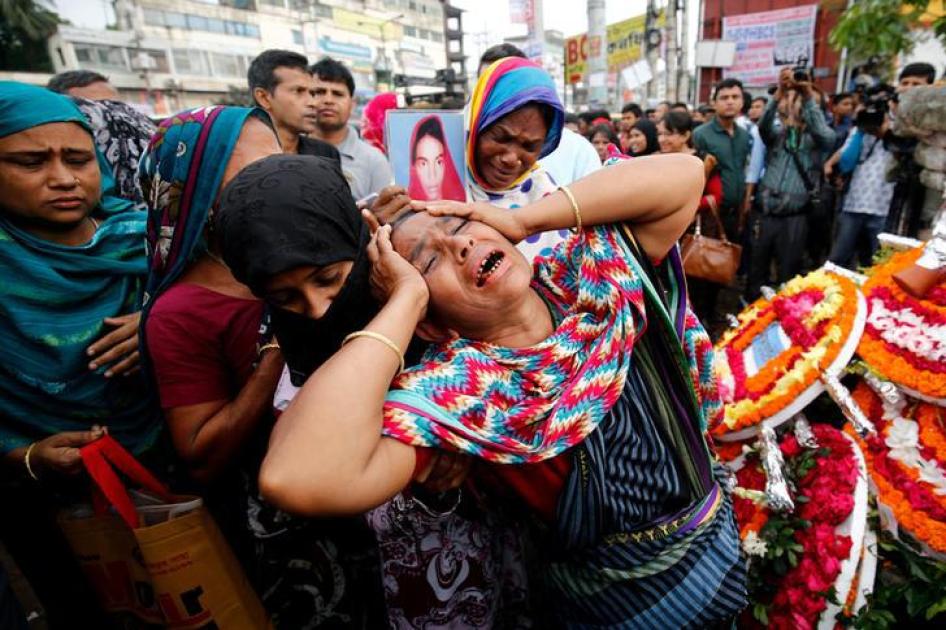The United Nations formally recognized a decade ago that businesses have a responsibility to respect human rights. It was a groundbreaking development. 10 years later, it’s clear that it was only a first step: we need laws that enforce companies’ duty to protect workers and communities from abuse and hold them accountable if they don’t.
Human rights groups have for decades documented the connection between businesses and human rights abuses. From oil and mining companies’ reliance on abusive security forces to the tobacco industry’s use of child labor, we’ve shown how corporations have exploited their wealth and power to trample on the rights of workers and communities.
In June 2011, the international community finally acknowledged businesses’ human rights responsibilities, with the UN Human Rights Council adopting the Guiding Principles on Business and Human Rights (UNGPs). The Principles state that companies should identify and address the human rights impacts of their operations, including in their global supply chains.
Since their adoption, the Principles have helped to normalize the idea that companies should respect human rights and prompted dozens of businesses to publicly commit to do so. We cite the Principles regularly, such as when we urge jewelry companies to source minerals from mines free of child labor or for banks to stop funding unlawful settlement construction in the occupied West Bank. The Principles have also led companies to develop systems and processes to identify human rights risks—and spawned an industry of consultants and auditors to help them.
The Principles’ big flaw, however, is that they are voluntary, with no enforcement mechanisms to ensure that companies respect human rights or to hold them accountable when things go wrong. For all the progress made, the past decade has been littered with examples of companies that have failed to live up to their human rights responsibilities.
In the apparel industry, millions of workers continue to toil in abusive conditions in factories that supply global brands. In 2013, over 1,100 workers died and 2,000 were injured when the Rana Plaza building, housing garment factories, collapsed in Bangladesh. Following the tragedy, apparel brands and manufacturers worked with unions and civil society groups to develop the Bangladesh Accord on Fire and Building Safety, a mechanism for identifying and correcting fire and building safety concerns. But such initiatives are few and far between, can be politically fraught, and ultimately it’s up to companies to decide whether to participate.
The mining sector also remains a major source of problems. In just one example, in January 2019, the collapse of a mine tailings dam caused a deluge of toxic mud and mining waste to sweep through the town of Brumadinho, Brazil, burying more than 250 people alive. Vale, the company that operated the dam, had in 2014 published a human rights policy that referenced the UN Principles. Yet, according to an inquiry by Brazil’s Congress and an independent investigation commissioned by Vale, the company pressured third-party auditors to falsely certify that the dam was safe. Vale had also co-owned another dam, this one in the town of Mariana, whose 2015 collapse had killed 19 people and caused widespread environmental damage.
Governments and legislatures are increasingly beginning to realize that, to really protect workers and communities, binding laws and rules are needed now.
France in 2017 adopted a law requiring large companies to identify and prevent human rights violations and environmental damage in their operations, including their supply chains. The law also allows victims and civil society organizations to sue companies that fail to meet these obligations.
Germany’s parliament on June 11 passed a law requiring large companies to identify and address human rights and environmental risks in their direct supply chains, and making companies subject to fines if they don’t.
The European Union as a whole is now considering legislation requiring companies to respect human rights and the environment in global supply chains.
The laws, although not perfect, are establishing a precedent that other governments should follow. Multinational companies will increasingly have to integrate effective human due diligence. Companies will have a competitive advantage if they integrate human rights protections before laws become commonplace the world over.
The adoption of the Principles was an important step. The next decade should focus on ensuring that companies live up to their human rights responsibilities. Many companies will only do what the law requires. We need more and better laws to ensure that companies respect human rights and hold them to account if they don’t.









